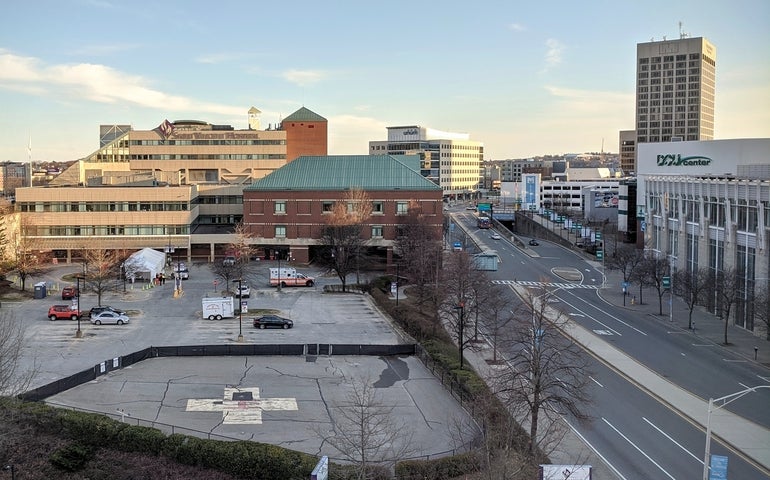As they care for thousands of COVID-19 patients in one of the states hardest hit so far by the pandemic, Massachusetts hospitals say they are getting shortchanged on federal relief funds, compared to counterparts in other states.
According to the Massachusetts Health and Hospital Association, formulas used by the federal government to distribute money to states, coupled with an early cutoff date for tallying cases of the respiratory disease, meant that a large surge of cases here was not fully counted and that less money flowed to the Bay State “at a time when it is needed most,” the trade group wrote in its Monday newsletter.
The preparations hospitals made to treat an influx of COVID-19 cases and reduce the risk of infection for other patients and workers forced dramatic adjustments — elective procedures were put on pause under a March Baker administration order, new protocols around protective gear were implemented, and additional spaces were created to test and treat patients.
As of Sunday, 3,128 COVID-19 patients were hospitalized in Massachusetts, including 810 in intensive care units. That’s down from an April 21 high of 3,965 hospitalizations, according to Department of Public Health data.
The costs of COVID-19 care, lost revenue from canceled surgeries, capital costs, and expenses associated with extra personal protective equipment and supports for frontline workers have all added up to what the American Hospital Association estimates will be a $202.6 billion loss for the nation’s hospitals and health systems over the four-month period from March through June.
“The totality of these costs combined with the uncertainty of the pandemic’s duration is certain to imperil hospital finances,” the AHA said in a new report. “After years of declining margins, it was only recently that many of the credit rating agencies expressed optimism about hospitals’ ability to weather low payment rates from government providers amidst increasing enrollment in government programs, competition from tech disruptors, and other increasing costs such as prescription drugs, and salary and wages. A third of U.S. community hospitals had negative operating margins in 2018.”
The report said the federal government “moved quickly to provide relief,” but “more help is needed.” The Coronavirus Aid, Relief and Economic Security Act allocated $100 billion for provider relief, and legislation approved later added $75 billion to the fund.
In late April, the American Hospital Association wrote to U.S. Health and Human Services Secretary Alex Azar, flagging concerns with distribution of the funds, saying that hospitals and health systems “that have been on the front lines of the emergency received the same amount proportionally as providers and suppliers who have no role in addressing COVID-19.”
The following week, on May 7, U.S. House Ways and Means Committee Chairman Richard Neal of Massachusetts and Energy and Commerce Committee Chairman Frank Pallone of New Jersey wrote their own letter to Azar and Centers for Medicare and Medicaid Services administrator Seema Verma about the $175 billion in provider relief.
Pallone and Neal wrote that the approach used to distribute an initial $30 billion round of aid “clearly fails to target funding based on the statutory framework relating to COVID-19 driven costs, and in fact the level of funding appears to be completely disconnected from need.” A second, $20 billion installment, they said, is being sent out under a similar distribution model, with eligibility limited to those who received funding in the first round.
“Moreover, as the second formula-based distribution also did nothing to factor in actual funding needs or COVID-19 related revenue shortfalls, funding for providers directly impacted by COVID-19 and who are fighting on the frontlines to treat and contain this crisis has remained wholly inadequate,” they wrote.
Pallone and Neal come from the states with the second- and third-highest numbers of COVID-19 cases, after New York, according to figures from the Centers for Disease Control and Prevention.
The Massachusetts Health and Hospital Association concluded that Massachusetts received the second-lowest amount of federal hospital relief funds per COVID-19 case out of any state.
“The estimated amount distributed to Massachusetts hospitals per COVID-19 case as of May 3 was $15,730, compared to, say, the $617,000 per-case amount given to Montana hospitals,” the association said in its “Monday Report” newsletter.
Rhode Island received the lowest amount per case, the association said.
Neal and Pallone described the efforts to establish the provider relief fund as “at best, a series of missteps, and at worst, a disregard of Congress’ intent for the program.”
“As demonstrated by the Administration’s inability to capture all provider types and to target funding to those who are most in need of assistance, formula-based distribution mechanisms are insufficient to address the crisis in our healthcare system,” the congressmen wrote. “Moreover, such a distribution mechanism runs counter to Congressional intent and to the program language signed into law, which requires funds to be distributed through an application-based process to reimburse for specific COVID-related expenses and lost revenue.”
As COVID-19 case numbers climbed in March and April, state officials announced plans to inject more than $1.6 billion into the Massachusetts health care system.
When Gov. Charlie Baker announced an $800 million investment on April 7, he said that the state could cover the costs using “offsets, reductions in MassHealth and enhanced federal revenue” and that the money was “designed to make sure these folks are financially able to stand up all the things we need to stand up as part of the surge.”

